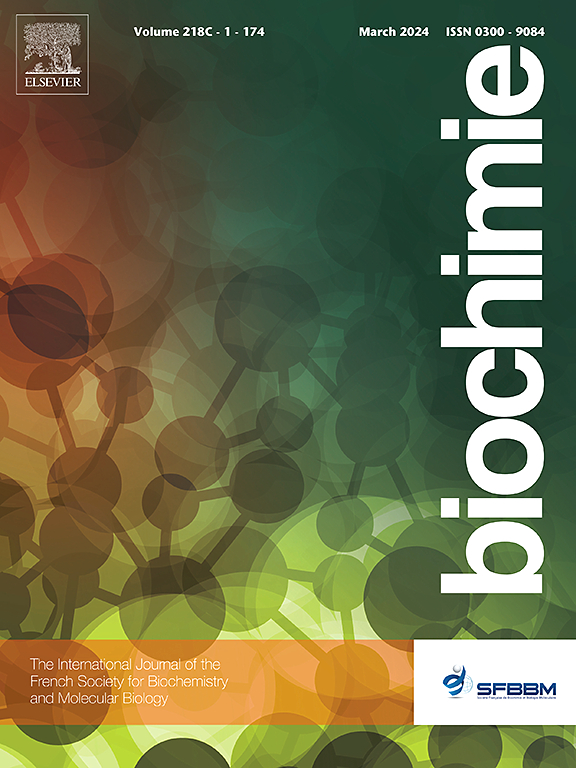芳基烃受体相互作用蛋白 N-域的突变会影响与热休克蛋白 90β 和磷酸二酯酶 4A5 的相互作用。
IF 3.3
3区 生物学
Q2 BIOCHEMISTRY & MOLECULAR BIOLOGY
引用次数: 0
摘要
芳基烃受体相互作用蛋白(AIP)是一种细胞质分子辅助伴侣和肿瘤抑制因子,有助于蛋白质的稳定性和涉及芳基烃受体的复合物的形成。AIP 基因的种系突变易导致垂体肿瘤发生,患者表现出侵袭性临床表型。利用一种保持结构完整性和单体稳定性的方法,从大肠杆菌中纯化了携带 N-域突变(R9Q、R16H、V49M 和 K103R)的全长 AIP。突变不会对蛋白质的热稳定性产生重大影响,也不会对蛋白质结构造成整体破坏性影响。所研究的突变降低了 AIP 与其两个结合伙伴(热休克蛋白 90β 和磷酸二酯酶 4A5 (PDE4A5))的结合亲和力。所有突变体对 AIP 磷酸二酯酶活性的抑制作用也大大降低。虽然以前发表的数据主要集中在 AIP C 域的四重肽重复序列上,但我们提出了明确的证据,证明 AIP N 域突变在与伙伴蛋白的两种蛋白:蛋白相互作用中发挥了重要作用。AIP 复杂的相互作用组表明,不能忽视其一个或多个结合伙伴的任何可观察到的变化,因为这可能会对其他生化途径产生影响。本文章由计算机程序翻译,如有差异,请以英文原文为准。

Mutations in the N-domain of aryl hydrocarbon receptor interacting protein affect interactions with heat shock protein 90β and phosphodiesterase 4A5
The aryl hydrocarbon receptor interacting protein (AIP) is a cytoplasmic molecular co-chaperone and tumour suppressor that assists in protein stability and complex formation involving the aryl hydrocarbon receptor. Germline mutations in the AIP gene predispose to pituitary tumourigenesis with patients exhibiting an aggressive clinical phenotype. Full length AIP proteins harbouring N-domain mutations (R9Q, R16H, V49 M and K103R) were purified from E.coli utilizing a methodology that maintained structural integrity and monomeric stability. Mutations did not significantly affect the thermal stability of the protein and caused no overall disruptive effect in the protein structure. The mutations studied lowered the binding affinity of AIP towards two of its binding partners; heat shock protein 90β and phosphodiesterase 4A5 (PDE4A5). The inhibition of phosphodiesterase activity by AIP was also greatly reduced by all mutants. While previously published data has mainly concentrated on the tetratricopeptide repeats of the C-domain of AIP, we present clear evidence that AIP N-domain mutations play a significant role in two protein:protein interactions with partner proteins. The complex interactome of AIP suggests that any observable change in one or more of its binding partners cannot be disregarded as it may have repercussions on other biochemical pathways.
求助全文
通过发布文献求助,成功后即可免费获取论文全文。
去求助
来源期刊

Biochimie
生物-生化与分子生物学
CiteScore
7.20
自引率
2.60%
发文量
219
审稿时长
40 days
期刊介绍:
Biochimie publishes original research articles, short communications, review articles, graphical reviews, mini-reviews, and hypotheses in the broad areas of biology, including biochemistry, enzymology, molecular and cell biology, metabolic regulation, genetics, immunology, microbiology, structural biology, genomics, proteomics, and molecular mechanisms of disease. Biochimie publishes exclusively in English.
Articles are subject to peer review, and must satisfy the requirements of originality, high scientific integrity and general interest to a broad range of readers. Submissions that are judged to be of sound scientific and technical quality but do not fully satisfy the requirements for publication in Biochimie may benefit from a transfer service to a more suitable journal within the same subject area.
 求助内容:
求助内容: 应助结果提醒方式:
应助结果提醒方式:


